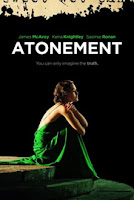Atonement
Atonement by Ian McEwan
originally published in 2001 and turned into a movie adaptation in 2007
starring Kiera Knightly (Cecilia) and James McAvoy (Robbie) is an incredible
story of how one person’s perspective can have a rippling effect throughout
time.
I must confess that this is one of my favourite books as well as movies. The story itself is incredibly detailed and cleverly told, as the way McEwan articulates himself and his story as a writer is amazing.
The story takes place in multiple different time periods, showcasing how one little girl; Briony can have such a great effect on the outcome of so many different people’s lives. The story itself has a continuous movement between romance, war, class, guilt and forgiveness. Throughout the book McEwan uses pace as a means to articulate the events or feelings he is describing for each character, giving them the correct attention. Each character’s inner monologue ensures that the narrative is well filtered providing the reader with the option to judge and create an understanding of who they are.
In comparison, the movie, which was an amazing adaptation, however, there was less of a build-up of tension in comparison to the book. The movie instead is split evenly to showcase the events following Briony's accusations and the love that bound Cecilia and Robbie. There are very limited differences between book and movie which I think shows how the adaptation pays homage to the story and meaning behind it. Despite many not liking the end of the story in reference to Briony providing Cecilia and Robbie with a happy ending, I think it was a perfect way to provide them with the ending they deserved.
Therefore, I would suggest both book and movie as they are two artistic creations that bring a whole new meaning to Atonement, with the movie complimenting McEwan's literary skills bringing his vision to life perfectly.
I must confess that this is one of my favourite books as well as movies. The story itself is incredibly detailed and cleverly told, as the way McEwan articulates himself and his story as a writer is amazing.
The story takes place in multiple different time periods, showcasing how one little girl; Briony can have such a great effect on the outcome of so many different people’s lives. The story itself has a continuous movement between romance, war, class, guilt and forgiveness. Throughout the book McEwan uses pace as a means to articulate the events or feelings he is describing for each character, giving them the correct attention. Each character’s inner monologue ensures that the narrative is well filtered providing the reader with the option to judge and create an understanding of who they are.
In comparison, the movie, which was an amazing adaptation, however, there was less of a build-up of tension in comparison to the book. The movie instead is split evenly to showcase the events following Briony's accusations and the love that bound Cecilia and Robbie. There are very limited differences between book and movie which I think shows how the adaptation pays homage to the story and meaning behind it. Despite many not liking the end of the story in reference to Briony providing Cecilia and Robbie with a happy ending, I think it was a perfect way to provide them with the ending they deserved.
Therefore, I would suggest both book and movie as they are two artistic creations that bring a whole new meaning to Atonement, with the movie complimenting McEwan's literary skills bringing his vision to life perfectly.





Suggest to read the book first time
ReplyDeleteLoved both…. Sometimes they get it right when they adapt a book
ReplyDeleteI loved this book, the film was good but much preferred the book.
ReplyDeleteI think I need to definitely give it a read now
ReplyDeleteI read the book before seeing the film and I think that a better way around to do it. The book is far more detailed and nuanced. The film is beautifully shot and so stylish. A real feast for the eyes.
ReplyDeleteLynwen G